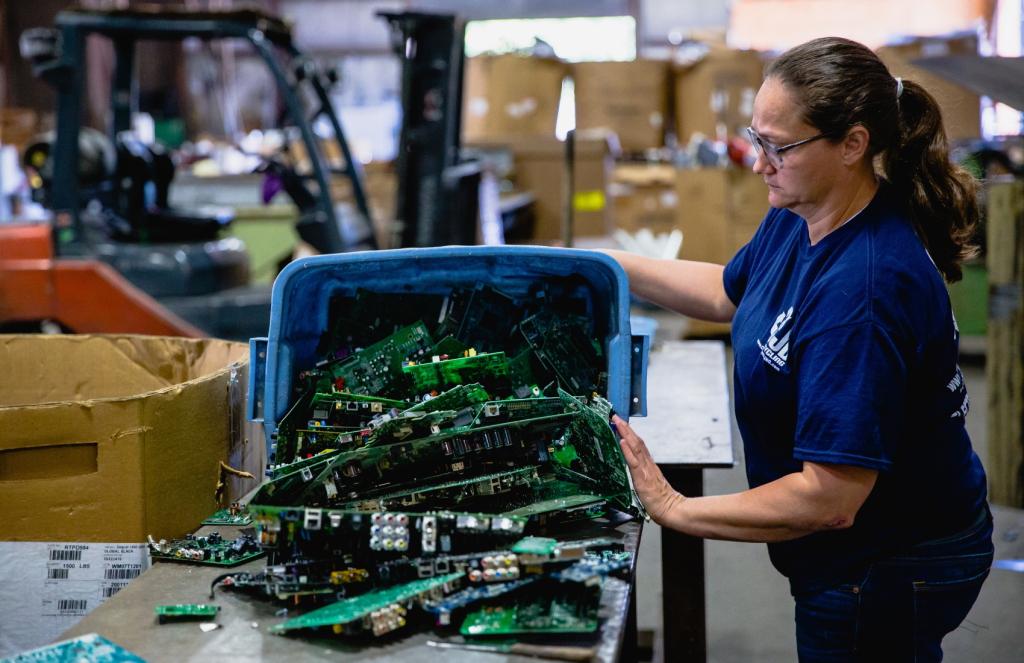Is It Illegal to Throw Away Electronics? Complete Guide to Electronics in Dumpster Laws
If you’re wondering whether it’s illegal to throw away electronics, the short answer is: yes, in most places. Twenty-eight US states, including California, New York, and Texas, have passed e-waste laws that make it illegal for consumers to dispose of electronics in dumpsters or regular trash. But the story goes much deeper than a simple yes or no.
The reality is that electronics disposal laws vary dramatically by location, and the penalties for putting electronics in dumpsters can be severe. From Illinois’ $25 first-time fines to California’s potential $10,000 penalties, understanding these regulations isn’t just about compliance—it’s about protecting your wallet, your business reputation, and our environment.
Is It Illegal to Put Electronics in Dumpster? State Laws Explained
The State-by-State Patchwork of Electronics Disposal Laws
Here in Illinois, where CJD E-Cycling serves the Metro East and St. Louis areas, it’s illegal to throw away electronics into the trash or put electronics in dumpsters. Since 2012, the state has banned electronics from landfills, and violations start with a $25 fine for first-time offenders. But don’t let that relatively modest penalty fool you—repeat violations and larger quantities can result in much steeper consequences.
The enforcement is real. As EPA-certified recyclers with over a decade of experience serving the Metro East, we’ve seen local businesses face unexpected fines when waste auditors discover electronics in their dumpsters. Sometimes it’s a smartphone someone forgot in their desk drawer. Other times, it’s boxes of outdated equipment that staff assumed could just be “thrown away.”
Electronics Disposal Laws by State: Penalty Comparison
| State | Electronics Disposal Status | First-Time Penalty | Repeat Offense | Additional Notes |
|---|---|---|---|---|
| Illinois | Illegal | $25 | Escalating fines | Complete landfill ban since 2012 |
| California | Illegal | Up to $10,000 | Criminal charges | 6 months jail possible |
| New York | Illegal | $100 | Higher fines | Statewide ban since 2015 |
| Connecticut | Illegal | $99-$250 | $250-$1,000 | Manufacturer responsibility |
| Minnesota | Illegal | $25-$100 | $100-$300 | CRT-specific regulations |
| Wisconsin | Illegal | $50-$200 | $200-$500 | Mercury device bans |
| Texas | Varies by city | $25-$500 | $500-$2,000 | Local ordinances vary |
| Missouri | Limited laws | Varies | Varies | Primarily CRT regulations |
Across state lines in Missouri, where many of our St. Louis metro clients operate, the regulations are less comprehensive but still exist for certain items. This creates a confusing landscape for businesses and residents who operate across state boundaries.
California leads the pack with some of the strictest enforcement. California Penal Code 374.3 makes illegal dumping on public and private property punishable by a fine up to $10,000, and they’re not afraid to use it. Major companies like Target have paid over $3.5 million to settle accusations of improper e-waste handling, while Comcast agreed to pay California $25.95 million for improper e-waste disposal.
Why These Electronics Disposal Laws Exist
When we break down electronics at our CJD E-Cycling facility, we see firsthand why it’s illegal to dispose of electronics improperly. Inside every device are heavy metals like lead, mercury, and cadmium—substances that don’t belong in our soil or water supply. Electronics recycling recovers valuable materials and ensures data security, while laws in states like Illinois mandate proper e-waste disposal to prevent ecological harm and protect privacy.
The numbers are staggering. According to the UN Institute for Training and Research in 2022, the US is the second-biggest generator of e-waste in the world after China, producing almost 16 billion pounds annually. When electronics end up in landfills, those toxic materials leach into groundwater. When they’re incinerated, they release harmful chemicals into the air we breathe.
But there’s another side to this story: resource recovery. The gold in your old smartphone, the silver in circuit boards, the copper in cables—these materials have real value. When electronics go into dumpsters, we lose the opportunity to recover these resources, forcing new mining operations that damage pristine environments.
Electronics in Dumpster: Legal Penalties by State
Real Financial Consequences We’ve Witnessed
The penalties for throwing electronics in dumpsters vary significantly, but they’re universally unpleasant:
Individual Penalties for Illegal Electronics Disposal:
- Illinois: $25 for first-time violations, escalating for repeat offenses
- New York: $100 fines for electronics disposal violations
- California: Up to $10,000 under state law, plus potential jail time up to six months
- Connecticut: $99-$250 for first offense, $250-$1,000 for repeats
- Minnesota: $25-$100 initial fine, $100-$300 for subsequent violations
Business Consequences for Electronics in Dumpster Violations: The stakes are much higher for businesses. For felonies, fines can add up to thousands of dollars, and some fines accrue daily until the illegally dumped waste is cleaned up. We’ve seen local companies face:
- Initial fines ranging from hundreds to thousands of dollars
- Daily accumulating penalties until compliance is achieved
- Environmental cleanup costs if contamination occurs
- Potential criminal charges for repeat or large-scale violations
Real Case Studies: Major E-Waste Penalties
Corporate Violations:
- Target Corporation: $3.5 million settlement for improper e-waste handling
- Comcast: $25.95 million penalty in California for improper e-waste disposal
- Big Lots: $3.5 million settlement for e-waste violations
- Executive Recycling CEO: 30 months in jail plus $4.5 million company fine for illegal disposal
Local Business Examples:
- Springfield manufacturing company: $8,500 fine for computers found in dumpster
- Edwardsville medical office: $2,200 penalty for electronic medical devices in trash
- Metro East retail chain: $15,000 settlement for systematic e-waste violations
Beyond Money: The Hidden Costs of Illegal Electronics Disposal
Legal Complications: Someone convicted of illegal dumping can be subjected to incarceration, with misdemeanors typically carrying a maximum one-year jail sentence, while felonies can result in a year or more in prison.
Business Reputation: In our experience serving Metro East businesses, companies that face e-waste violations often struggle with the reputational damage. Environmental compliance has become a key factor in B2B relationships, and violations can cost you clients.
Insurance and Liability Issues: Some business insurance policies have environmental compliance clauses. Violations can affect coverage or premiums.
What Electronics Are Illegal to Throw Away?
The “Anything with a Cord” Rule for Electronics Disposal
At CJD E-Cycling, we use a simple guideline that covers most scenarios: if it has a cord or runs on batteries, it’s likely illegal to throw away in dumpsters. This includes:
Obviously Illegal Electronics to Dispose Of:
- Computers, laptops, and tablets
- Smartphones and cell phones
- Televisions and monitors (especially CRT models)
- Printers, scanners, and fax machines
- Gaming consoles and electronic toys
- Audio equipment and stereos
Less Obvious Items People Often Miss:
- Digital clocks and alarm clocks
- Electronic scales and measuring devices
- Power tools with electronic components
- Kitchen appliances with digital displays
- Car electronics and GPS devices
- Medical devices with electronic components
- Electronic thermostats and controls
Special Attention Items for Illinois Disposal Laws:
- Cathode ray tubes (CRTs) from old monitors and TVs require special handling due to lead content
- Mercury-containing devices (some thermostats, medical equipment)
- Lithium battery devices (fire hazard in garbage trucks)
- Circuit boards and computer components
Illinois-Specific Covered Devices
According to Illinois electronics disposal laws, the following devices are explicitly banned from landfills and dumpsters:
Covered Computer Equipment:
- Desktop computers and laptops
- Computer monitors and displays
- Computer peripherals (keyboards, mice, speakers)
- Computer servers and networking equipment
Covered Television Equipment:
- All television sets regardless of size
- Digital converter boxes
- Cable and satellite receivers
- DVD players and VCRs
Additional Electronic Equipment:
- Printers, scanners, and fax machines
- Telecommunication equipment
- Electronic games and toys
- Portable digital music players
The key is understanding that modern manufacturing puts electronic components in almost everything. That “smart” appliance? It contains circuit boards that shouldn’t go to landfills. That digital thermostat? Same story.
Legal Alternatives: How to Dispose of Electronics Properly
Professional E-Waste Recycling Services in Metro East
This is where CJD E-Cycling comes in. As a family-owned, full-service electronics recycler serving the St. Louis and Metro East areas for over a decade, we’ve built our business around solving exactly this problem. CJD E-Cycling follows all Illinois laws and regulations and is an EPA-approved collector.
What makes professional electronics recycling the smart choice:
Legal Compliance: When you work with a certified recycler like us, you’re protected from illegal electronics disposal penalties. We provide documentation of proper disposal that you can use in audits or compliance reviews.
Data Security: Even if devices are broken, skilled individuals can retrieve data from them. E-waste recycling through authorized channels ensures that data is securely wiped, reducing the risk of data breaches and identity theft. At CJD, we don’t just recycle your electronics—we ensure your sensitive data is completely destroyed using DOD-certified methods.
Environmental Responsibility: When done responsibly, electronic scrap recycling prevents harmful chemicals from polluting our environment. We turn as much electronic waste into new materials or refurbished goods as possible, diverting over 500 tons annually from Metro East landfills.
CJD E-Cycling Service Options
Convenient Drop-Off Locations:
- Edwardsville Facility: 5257 N State Route 157, Edwardsville, IL 62025
- East Alton Location: Serving the broader Metro East region
Flexible Service Options:
- Walk-in drop-off for residents (no appointment needed)
- Scheduled pickup services for businesses
- Bulk data destruction and data center decommissioning
- Tailored pickup for large quantities
- On-site hard drive destruction services
Operating Hours:
- Monday-Friday: 9:00am – 4:30pm
- Saturday: 9:00am – 1:00pm
- Sunday: Closed
Accepted Electronics and Pricing
We Accept (Partial List):
- Computer accessories, including monitors, printers, keyboards, mice
- TVs (fee ranges from $5-$35 depending on size and model)
- Flat screen computer monitors ($2.50-$5 fee based on size)
- Digital converter boxes, cable receivers, satellite receivers
- Office equipment: servers, phones, fax machines, scanners
- Entertainment electronics: VCRs, DVD players, stereos
- Small electronics and anything with a power cord
Payment Methods: Cash, check, or credit card accepted at our facilities.
Alternative Disposal Options
Manufacturer Take-Back Programs: Many electronics manufacturers are legally required to provide recycling programs. These programs often require manufacturers to establish facilities accepting e-waste from consumers.
Retail Recycling Options:
- Best Buy: Accepts wide range of electronics, some restrictions apply
- Staples: Focuses on office electronics and computer equipment
- Cell phone stores: Often accept old phones and accessories
Municipal Collection Events: Many Metro East municipalities host periodic e-waste collection events. Contact your local government for schedules.
Business Compliance Guide: Avoiding Electronics in Dumpster Violations
Immediate Action Items for Business Owners
1. Audit Your Current Electronics Disposal Practices Stop what you’re doing and take a quick inventory. Walk through your office or facility and identify any electronics that might be destined for the dumpster:
- Old computers or laptops in storage
- Broken printers or scanners gathering dust
- Outdated phones or tablets in desk drawers
- Electronic accessories and cables
- Any device with a power cord or battery
2. Establish Clear Electronics Disposal Procedures Create a simple protocol that prevents illegal electronics disposal:
- Designate a secure collection area for e-waste
- Train all staff on what counts as electronics
- Create a simple decision flowchart for disposal choices
- Schedule regular pickup or drop-off with CJD E-Cycling
- Post signs near dumpsters reminding staff about electronics disposal laws
3. Employee Training on Electronics Disposal Laws Ensure everyone who handles waste disposal understands Illinois electronics disposal laws:
- Cleaning staff and janitors
- Office managers and administrative personnel
- Facilities and maintenance teams
- IT personnel handling equipment upgrades
Documentation and Compliance for Electronics Disposal
Legal Protection Requirements:
- Keep detailed records of all electronics disposal activities
- Save recycling certificates from certified processors like CJD E-Cycling
- Document employee training on electronics disposal laws
- Maintain disposal logs for audit purposes
- Store compliance documentation for minimum 3 years
Regular Review Process:
- Quarterly e-waste audits to identify disposal needs
- Annual policy reviews to ensure compliance with changing laws
- Staff refresher training on electronics disposal requirements
- Vendor compliance verification for all disposal partners
CJD E-Cycling Business Services
Tailored Solutions for Metro East Businesses:
- Regular scheduled pickups to prevent accumulation
- Bulk equipment disposal during office moves or upgrades
- Data center decommissioning with certified data destruction
- Asset recovery programs to offset disposal costs
- Compliance consulting for audit preparation
Industries We Serve:
- Healthcare facilities with electronic medical equipment
- Financial institutions requiring secure data destruction
- Educational institutions with computer lab equipment
- Manufacturing companies with electronic components
- Government agencies requiring certified disposal
FAQ: Common Questions About Illegal Electronics Disposal
What happens if I throw electronics in the trash?
If you’re caught throwing electronics in the trash or putting electronics in dumpsters, you can face fines ranging from $25 in Illinois to $10,000 in California. The penalties escalate for repeat violations, and businesses face higher fines than individuals. Beyond monetary penalties, you may face criminal charges, especially for large quantities or repeat offenses.
Is it illegal to throw away electronics in Illinois?
Yes, it’s illegal to throw away electronics in Illinois. Since 2012, the state has banned all covered electronic devices from landfills and incinerators. This includes computers, monitors, TVs, printers, and most electronic devices. First-time violations carry a $25 fine, with escalating penalties for repeat offenses.
How much does it cost to recycle electronics legally?
At CJD E-Cycling, most electronics recycling is free or low-cost. We charge $2.50-$5 for flat screen monitors and $5-$35 for TVs depending on size. Most other electronics including computers, phones, printers, and small devices are accepted at no charge. This is much less expensive than potential fines for illegal disposal.
Which electronics are illegal to throw away?
Any electronic device with a cord or battery is generally illegal to throw away in Illinois and most other states. This includes computers, phones, TVs, printers, gaming consoles, digital clocks, electronic scales, and power tools with electronic components. When in doubt, follow the “anything with a cord” rule.
Can I get fined for electronics in my business dumpster?
Yes, businesses face significant penalties for electronics found in dumpsters. We’ve seen local Metro East businesses fined $2,200-$15,000 for electronics disposal violations. Businesses are liable for employee actions, so comprehensive staff training and clear disposal procedures are essential.
What should I do with old computers and laptops?
Never put computers or laptops in dumpsters. Take them to a certified recycler like CJD E-Cycling for secure data destruction and proper recycling. We ensure all personal and business data is completely wiped using DOD-certified methods before recycling the components.
Are there free electronics recycling options in Metro East?
Yes, CJD E-Cycling offers free recycling for most electronics including computers, phones, printers, and small devices. We also participate in community collection events throughout the Metro East. Many manufacturers also offer free take-back programs for their products.
What’s the penalty for putting a TV in the dumpster?
TVs are specifically banned from dumpsters in Illinois, and violations can result in fines starting at $25 for individuals. Businesses face higher penalties. CRTs (old tube TVs) contain lead and require special handling. We accept all TVs for proper recycling with fees ranging from $5-$35 based on size.
Do electronics disposal laws apply to smartphones?
Yes, smartphones and cell phones are covered under electronics disposal laws and cannot be thrown in dumpsters. They contain valuable materials like gold and rare earth elements, plus lithium batteries that pose fire hazards in garbage trucks. Many cell phone stores offer free recycling, or bring them to CJD E-Cycling.
How do I dispose of electronics during an office move?
Plan ahead for office moves to avoid illegal electronics disposal. Contact CJD E-Cycling at (618) 659-9006 to schedule bulk pickup services. We can handle everything from single computers to entire data centers, ensuring compliance and providing documentation for your records.
Take Action Today: Don’t Risk Electronics Disposal Violations
Is it illegal to throw away electronics? In Illinois and 27 other states, absolutely—and the penalties are real and growing. But more importantly, proper electronics disposal is about being a responsible member of your community and protecting the environment we all share.
The good news is that legal electronics disposal doesn’t have to be complicated or expensive. With local resources like CJD E-Cycling, you can ensure compliance, protect your data, and contribute to a more sustainable future.
Your Next Steps for Legal Electronics Disposal
Don’t wait for a violation notice or fine. Take action today:
- Immediate Need? Call CJD E-Cycling at (618) 659-9006 for same-day guidance on electronics disposal laws
- Planning Ahead? Schedule a consultation to discuss your ongoing e-waste needs and compliance requirements
- Business Owner? Ask about our compliance documentation, employee training resources, and regular pickup services
Download Our Free Compliance Resources
- Electronics Disposal Checklist for Illinois businesses
- Employee Training Guide on e-waste laws
- Penalty Comparison Chart for Metro East businesses
- Quick Reference Guide to covered devices
Remember, every electronic device you recycle properly is one less potential environmental hazard and one more step toward avoiding costly violations. The question isn’t whether you can afford to recycle electronics properly—it’s whether you can afford the fines and reputation damage from illegal electronics disposal.
Ready to ensure your electronics disposal is legal, secure, and environmentally responsible? Contact CJD E-Cycling today. We’re here to help you navigate the regulations, protect your interests, and do the right thing for our Metro East community.
CJD E-Cycling is a family-owned, EPA-approved electronics recycling facility serving the St. Louis Metro East area since 2012. Our certified team has diverted over 500 tons of electronics from local landfills while ensuring complete compliance with Illinois electronics disposal laws. For more information about our services or to schedule a pickup, call (618) 659-9006 or visit us at 5257 N State Route 157, Edwardsville, IL.


